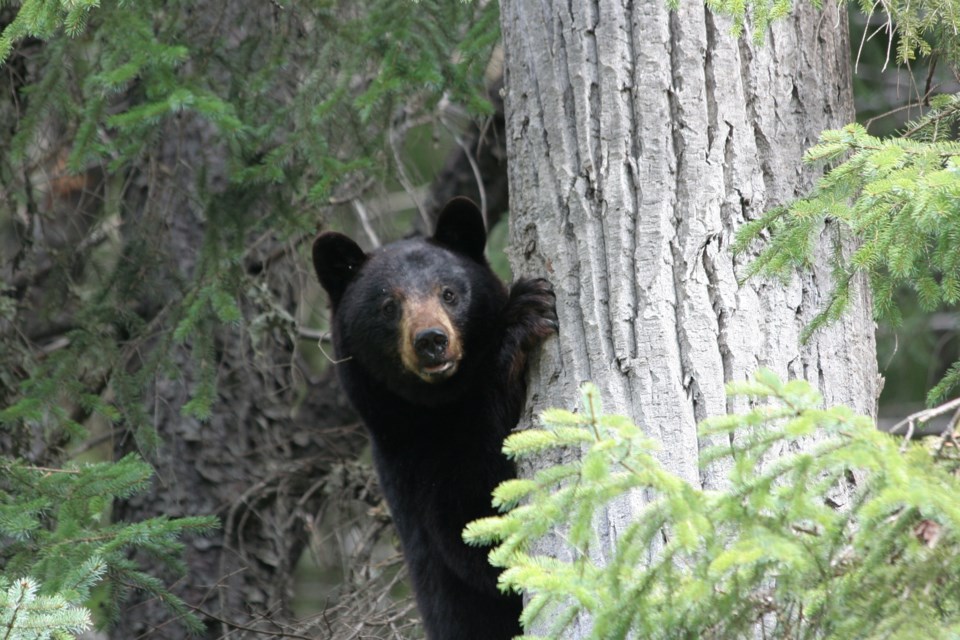The Resort Municipality of Whistler (RMOW) and B.C. Conservation Officer Service (COS) are warning Whistler residents and visitors to secure all wildlife attractants after receiving multiple reports of black bears accessing second- and third-storey patios in residential neighbourhoods in recent weeks.
Bears have been seen climbing to the upper-level decks in search of food on Nordic Drive and Tantalus Drive in particular, according to a July 28 bear alert issued by the municipality. The “main attractant” drawing bears to decks and balconies is barbecues, explained Sea to Sky-based conservation officer Brittany Mueller.
“Bears are still very active in Whistler and in the valley. They’re seeking out any food source, both natural and unnatural, and anything that has a scent,” she said, adding, “Bears will go to great lengths to find and source out any food reward.”
Bears have climbed their way to hard-to-reach rewards in Whistler in the past, Mueller explained, but the behaviour is still a little concerning. “Once they learn they’ll get a reward from somewhere, they’ll keep doing that same pattern,” she said.
“When they’re starting to go for the food reward and showing that indifferent behaviour, we just want to make sure that we’re doing everything we can to secure those attractants and to prevent that behaviour from escalating.”
Conservation officers are recommending Whistlerites secure barbecues in a garage or storage shed when not in use. If that’s not possible, ensure the grill is fully cleaned with the drip pan removed. “A lot of people forget about that, and if there’s a scent there, bears are still going to investigate it,” Mueller said.
Increased bear activity has also been reported recently at Whistler’s community garden plots in Cheakamus. Though bears aren’t typically interested in gardens, electric fences are a great tool to keep wildlife out, said Mueller, while gardeners should also do their best to keep attractants in check by picking vegetables and fruit as soon as they’re ripe.
If you spot a bear in close proximity to a home or potential attractants, Mueller recommended making lots of noise to scare the bear away. After receiving a few reports of bears and off-leash dogs interacting, the conservation officer also reiterated the importance of keeping pets on a leash and carrying bear spray on walks, even if you don’t plan to stray from the Valley Trail.
Bears are not naturally inclined to be fearful, said bear education expert Ellie Lamb, but are very intuitive and will pick up on humans’ tone of voice. Though they’re generally accommodating to people, bears often need to be shown boundaries, she added.
For example, “if a bear is in the garbage, you need to let the bear know he’s not allowed to be in the garbage, from a safe distance,” she said. “You [have to tell him], ‘Hey, you gotta go,’” in a firm voice.
If that doesn’t spook the bear, the next step would be to throw a few rocks. Finally, using bear spray, again from a safe distance, can serve as an effective teaching tool for the animal. “Just a hiss, you don’t need much; you just need a little bit and move him on,” said Lamb.
She added, “Expect good behaviour from these animals, but be prepared if you don’t get that.”
Several Sea to Sky trails and parks have been temporarily closed this summer in order to give a bear space after exhibiting aggressive behaviour, a tactic Lamb said local conservation officers deserve credit for.
“It’s a respectful thing to do,” she said. “I support that and I wish it was done more often.” However, Lamb said she’d like to see more violation tickets handed out to the people behaving irresponsibly with attractants or off-leash dogs.
A bear was killed in Whistler July 11 after it was filmed approaching a person sitting at a Whistler Village bus stop, “demonstrating escalating behaviour and posing a significant risk to public safety,” and after “multiple attempts to minimize further conflict,” according to the RMOW. The animal was one of two black bears reportedly destroyed in Whistler this summer, including a sow who was euthanized for humane reasons after appearing emaciated.
A black bear was also reportedly seen dead on the side of Highway 99 south of Whistler on Friday, July 29. Mueller confirmed no conservation officers were involved in any bears being put down in the resort over the BC Day long weekend. It’s assumed the bear was hit by a vehicle.
Residents can report unsecured animal attractants to RMOW Bylaw Services at 604-935-8280 or emailing [email protected]. Meanwhile, any concerning bear activity can be reported to the COS at 1-877-952-7277.



